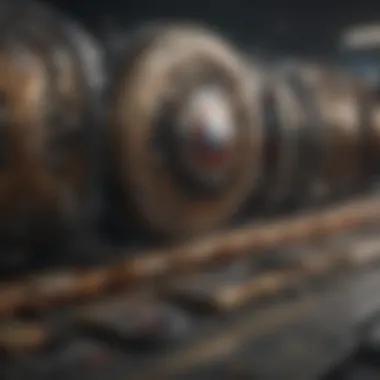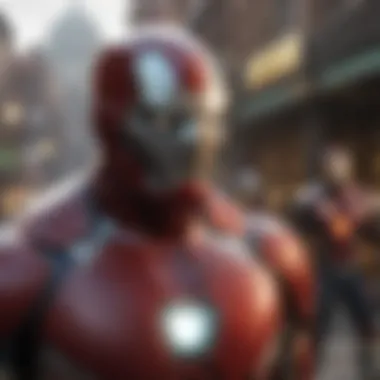Marvel Cinematic Universe Evolution: Comprehensive Timeline Exploration


Marvel Cinematic Universe (MCU) stands as a colossal testament to the evolution of superhero storytelling in modern cinema. Spanning over a decade, it has redefined the landscape of interconnected movies, diving deep into the intertwined narratives of beloved superheroes and villains.
Plot/Storyline Analysis
The chronological sequence of MCU movies offers a nuanced and intricate tapestry of storytelling. From the origin stories of Iron Man, Thor, and Captain America to the cosmic battles in Avengers: Infinity War and Endgame, each film weaves a crucial thread in the grand narrative. The seamless integration of standalone adventures with overarching plotlines elevates the viewing experience, creating a cinematic universe unlike any other.
Character Development
Central to the success of the MCU are its rich and multifaceted characters. Tony Stark's transformation from a self-absorbed genius to a selfless hero, Thor's journey of redemption and understanding, and Steve Rogers' unwavering integrity amidst changing times showcase the depth of character development within the universe. Villains like Loki and Thanos add layers of complexity, challenging the traditional hero-villain dynamic and leaving lasting impacts on the narrative landscape.
Visuals and Effects
The visual spectacle of the MCU is a testament to technological advancements in filmmaking. From dynamic action sequences to vibrant cosmic landscapes, each film showcases top-tier visual effects and cinematography. The attention to detail in costume design, makeup, and set pieces adds authenticity to the fantastical world, immersing viewers in a visually stunning cinematic experience.
Preamble
The Marvel Cinematic Universe (MCU) has become a cultural phenomenon, captivating audiences worldwide with its intricate storytelling and larger-than-life characters. Delving into the evolution of this expansive universe is not just a journey through blockbuster films; it is an exploration of interconnected narratives, character arcs, and thematic depth that have redefined the superhero genre in cinema. This article serves as a comprehensive guide, meticulously charting the timeline of the MCU from its inception to the latest releases, offering readers a detailed analysis of the key points and significant developments that have shaped this iconic franchise.
In understanding the importance of the introduction section in this article, it is crucial to recognize that the MCU is not merely a collection of standalone movies but a meticulously crafted tapestry where each entry contributes to a larger narrative arc. The introduction sets the stage for readers, highlighting the significance of tracing the evolution of characters like Iron Man, Captain America, and Thor, whose individual journeys intersect in epic crossovers like 'The Avengers' and 'Infinity War.' By immersing ourselves in the origins of the MCU, we gain a deeper appreciation for the complexities of storytelling, character development, and world-building that have made these films enduring classics.


Moreover, the introduction provides a contextual lens through which readers can explore the progression of the MCU phases, from the early days of 'Iron Man' and 'The Incredible Hulk' to the climactic battles of 'Avengers: Infinity War.' By understanding the chronological sequence of these films, viewers can appreciate the meticulous planning and foreshadowing that have been integral to the MCU's success. This section serves as a gateway into a world of superheroes, villains, and moral dilemmas, inviting readers to unravel the layers of symbolism and social commentary that underpin each cinematic installment.
As we embark on this journey through the Evolution of the Marvel Cinematic Universe, we invite readers to immerse themselves in a tapestry of interconnected storylines, larger-than-life conflicts, and the timeless struggle between good and evil. The introduction sets the tone for a deep dive into the heart of the MCU, inviting audiences to witness the growth of beloved characters, the evolution of intricate plotlines, and the unfolding of epic sagas that have left an indelible mark on the landscape of modern cinema.
Phase 1: The Origins
Phase 1 of the Marvel Cinematic Universe marked the inception of a groundbreaking storytelling saga. It laid the foundation for a universe that would captivate audiences worldwide. The commencement with 'Iron Man' in 2008 set the tone for what was to come - the birth of iconic superheroes, intricate plotlines, and interconnected narratives that would redefine the superhero genre.
Iron Man ()
'Iron Man' not only introduced viewers to the character of Tony Stark but also kickstarted a phenomenon that would shape the future of the MCU. Robert Downey Jr.'s portrayal of the charming yet flawed superhero resonated with fans, setting a high bar for character development in superhero movies. The film showcased the perfect blend of action, humor, and heart, laying the groundwork for the expansive universe that followed.
The Incredible Hulk ()
'The Incredible Hulk' brought another dimension to Phase 1, exploring themes of power and responsibility through Bruce Banner's struggles with the Hulk. While not as well-received as 'Iron Man,' the film contributed to the world-building of the MCU, hinting at the larger connections that would unfold in future installments.
Iron Man ()
'Iron Man 2' delved deeper into Tony Stark's character, balancing his superhero persona with his personal demons. The introduction of new characters like Black Widow and War Machine further expanded the universe, setting the stage for the ensemble-driven storytelling that would define later phases. Despite mixed reviews, 'Iron Man 2' played a crucial role in establishing key themes and character dynamics within the MCU.
Phase 2: Expansion and Collaboration
In this enlightening segment of the article, we delve into the pivotal Phase 2 of the Marvel Cinematic Universe, exploring its significance in the grand tapestry of cinematic storytelling. Phase 2 marks a crucial juncture in the MCU's evolution, characterized by the expansion of the interconnected universe and the forging of collaborative narratives that laid the groundwork for epic crossovers to come. This phase not only deepened the lore of individual characters but also laid the foundation for larger team-ups and conflicts that would resonate throughout the MCU.
Marvel Studios ingeniously crafted Phase 2 to intertwine the standalone adventures of our beloved heroes while planting the seeds for overarching storylines that would culminate in spectacular ways. The synergy between films like 'Iron Man 3', 'Thor: The Dark World', and 'Captain America: The Winter Soldier' exemplified the interconnected nature of the MCU, providing fans with a cohesive and immersive viewing experience.
Moreover, Phase 2 introduced new players to the MCU landscape, such as the enigmatic Guardians of the Galaxy, expanding the narrative canvas beyond Earth-bound heroes to cosmic realms. By embracing diversity in storytelling and tonal shifts, Marvel Studios showcased its versatility in weaving compelling tales that resonated with audiences worldwide.
As we navigate through the intricate web of Phase 2, it becomes evident that collaboration was at the core of this evolutionary phase. The amalgamation of disparate story arcs, character motivations, and thematic elements laid the groundwork for future team dynamics, conflict resolutions, and the inevitable clash of titans in 'Avengers: Age of Ultron'. Phase 2 stands as a testament to Marvel's bold vision and meticulous planning, setting the stage for larger-than-life showdowns and emotional payoffs that define the essence of the Marvel Cinematic Universe.
Phase 3: The Climactic Saga
In the intricate tapestry of the Marvel Cinematic Universe, Phase 3 emerges as a pivotal juncture, setting the stage for epic showdowns and dramatic resolutions. This phase marks the culmination of intricate plotlines and character arcs built over preceding movies, crafting a narrative mosaic of entwined destinies and conflicting motivations. The stakes are higher, the emotions more profound, as our beloved heroes face their greatest challenges yet. Phase 3 encapsulates the essence of a saga reaching its climactic crescendo, enthralling audiences with its blend of action, emotion, and intrigue.
Captain America: Civil War ()
Among the gems of Phase 3, 'Captain America: Civil War' stands out as a defining chapter in the MCU's evolution. The movie delves deep into the ideological divide among superheroes, exploring themes of accountability, loyalty, and consequence. As the Avengers fracture under the weight of conflicting beliefs, friendships are tested, alliances strained, leading to a riveting clash of titans that reverberates across the Marvel universe. 'Civil War' not only delivers pulse-pounding action sequences but also delves into the emotional cores of its characters, exposing vulnerabilities and strengths in equal measure.
Thor: Ragnarok ()
'Thor: Ragnarok' embraces a new tonal direction, infusing the MCU with a vibrant blend of humor, heart, and heroism. As Thor navigates the chaos of Asgard’s destruction and confronts his past, the movie weaves a narrative tapestry of redemption and renewal. Director Taika Waititi imbues the film with a whimsical charm, elevating Thor's journey to new heights of spectacle and emotion. With the introduction of iconic characters like Valkyrie and the unforgettable Loki, 'Ragnarok' reshapes the perception of Asgard and paves the way for a fresh chapter in Thor's odyssey.


Avengers: Infinity War ()
As Phase 3 draws to a staggering close, 'Avengers: Infinity War' emerges as the climactic zenith of the MCU saga, uniting heroes from across dimensions in a battle for the fate of existence itself. The movie orchestrates a symphony of action, drama, and sacrifice, weaving together multiple storylines into a tapestry of cosmic proportions. With Thanos looming large as the ultimate antagonist, the Avengers are pushed to their limits, testing their resolve, bonds, and values. 'Infinity War' shatters expectations, leaving audiences reeling from its impact, setting the stage for an epic conclusion in Phase 4.
Phase 4: A New Era
Phase 4 ushers in a new chapter for the Marvel Cinematic Universe, marking a significant transition from the epic culmination of Phase 3. With Phase 4, Marvel introduces a fresh lineup of characters, narratives, and themes that promise to push the boundaries of storytelling and world-building within the MCU. This phase not only expands the roster of superheroes but also delves into uncharted territories, exploring diverse genres and introducing audiences to lesser-known yet compelling characters. The advent of Phase 4 signifies a bold step towards evolution and innovation, keeping the audience on the edge of their seats in anticipation of what lies ahead. Marvel Studios combines familiar faces with exciting new additions in Phase 4, creating a dynamic tapestry that sets the stage for intriguing developments and interconnected storylines.
Black Widow ()
As the inaugural film of Phase 4, 'Black Widow' shines a spotlight on Natasha Romanoff's enigmatic past, offering viewers a deeper insight into the character's motivations and struggles. Set after the events of 'Captain America: Civil War,' the film follows Natasha as she confronts her history as a spy and reunites with figures from her past. 'Black Widow' weaves a tale of espionage, family dynamics, and redemption, showcasing Natasha's resilience and humanity amidst a dangerous world. The movie not only pays homage to Natasha's legacy but also sets the stage for the future of the MCU, introducing pivotal characters and setting up intriguing plot threads that resonate throughout Phase 4.
Shang-Chi and the Legend of the Ten Rings ()
'Shang-Chi and the Legend of the Ten Rings' introduces audiences to a new superhero, Shang-Chi, and explores his journey of self-discovery and confronting his past. As the first Marvel movie with an Asian lead, 'Shang-Chi' brings representation to the forefront, enriching the MCU with diverse perspectives and cultural influences. The film blends martial arts action with mystical elements, diving into the mythology of the Ten Rings organization and its significance in the Marvel Universe. 'Shang-Chi' not only expands the scope of superhero storytelling but also deepens the interconnected web of characters and organizations within the MCU, paving the way for new narratives and collaborations.
Eternals ()
Unveiling the cosmic side of the Marvel Cinematic Universe, 'Eternals' delves into the timeless saga of immortal beings tasked with protecting humanity from ancient threats. As a film that spans millennia, 'Eternals' explores themes of destiny, sacrifice, and the complexities of superhuman existence. With a diverse ensemble cast and intricate world-building, the movie introduces audiences to celestial beings with a deep connection to Earth's history. 'Eternals' not only expands the cosmic landscape of the MCU but also sets the stage for cosmic adventures and intergalactic conflicts that reverberate across the vast expanse of the Marvel Universe. This film marks a crucial addition to Phase 4, establishing new frontiers and narrative threads that intertwine with existing storylines, inviting viewers to immerse themselves in a realm of wonder and awe.
Culmination
In delving deeply into the Marvel Cinematic Universe's evolution, the Conclusion section serves as the culminating piece binding the intricate timeline discussed throughout this comprehensive article. This segment acts as a reflective mirror initiating introspection into the profound impact the Marvel movies have had within the realm of cinematic sublimity. Focusing on the transformative journey that each phase encapsulated, the Conclusion unravels the essence of thematic coherence and character progression resonant within the Marvel saga. It amalgamates the essence of heroism, camaraderie, and growth intricately woven into the fabric of the MCU.
By assimilating the diverse strands of superhero lore and complex narrative interweavings, the Conclusion weaves a succinct yet profound tapestry of connectivity and intertextuality that define the very essence of the Marvel Cinematic Universe. It reflects upon the resonance of moral ideals, personal growth trajectories, and the larger-than-life conflicts that serve as allegorical elements mirroring our own humanity. Through a lens of critical analysis and deconstructive scrutiny, the Conclusion bids farewell to the past, celebrates the present, and beckons towards an uncertain yet exhilarating future within the enigmatic world of Marvel.
Elevating beyond a mere recount of events, the Conclusion serves as a beacon illuminating the transformative power of storytelling within popular culture and cinematic realms. It underscores the enduring appeal of iconic characters, intricate plotlines, and immersive world-building that have etched an indelible mark on the hearts and minds of audiences globally. As the credits roll on this insightful narrative journey, the reader is left with a profound sense of awe, contemplation, and anticipation, eager to embark on the next chapter in the ever-evolving saga of the Marvel Cinematic Universe.















